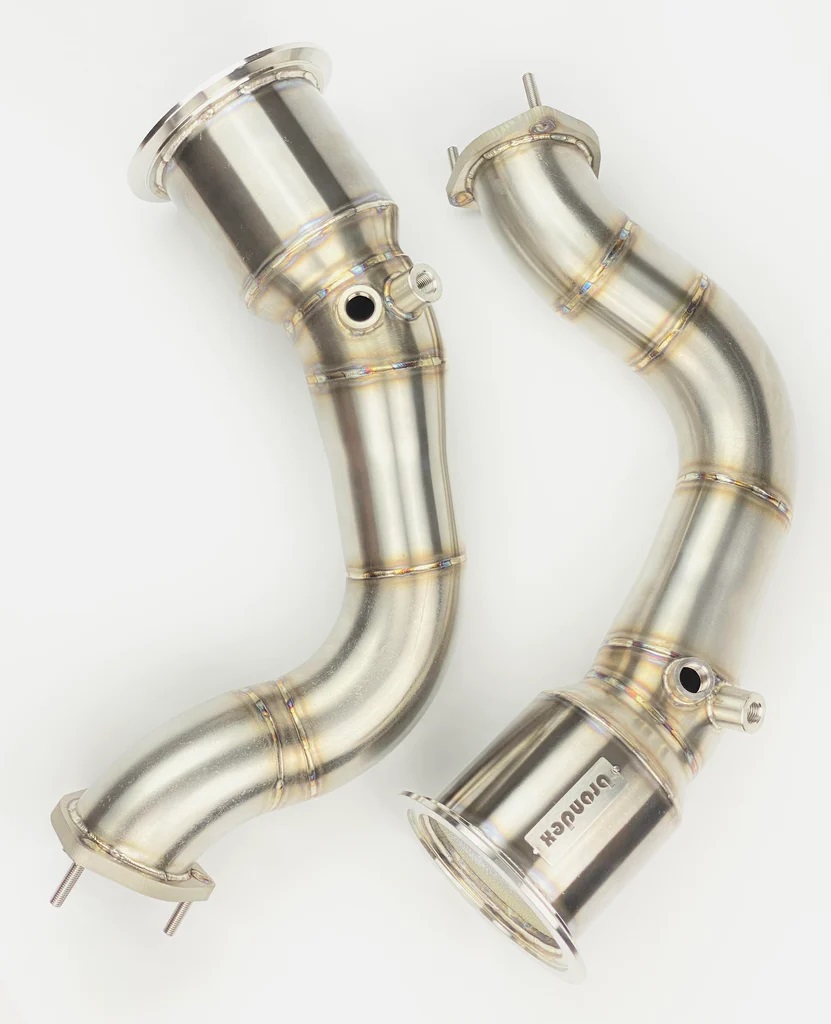The Audi RSQ8 and SQ7 are high-performance SUVs that combine luxury, power, and cutting-edge technology. These vehicles, part of Audi’s elite lineup, are known for their robust engines and impressive on-road performance. However, like all high-performance vehicles, there’s always room for improvement, especially when it comes to maximizing the power output and enhancing the exhaust system. One of the most common modifications for turbocharged engines, like those found in the Audi RSQ8 and SQ7, is the installation of aftermarket downpipes. In this article, we’ll explore everything you need to know about downpipes Audi RSQ8 SQ7, including their benefits, installation process, and how they impact overall vehicle performance.
What is a Downpipe?
A downpipe is a section of the exhaust system that connects the turbocharger to the rest of the exhaust setup. It is located between the turbo outlet and the catalytic converters or mid-pipe, depending on the vehicle. The main function of the downpipe is to direct exhaust gases away from the engine, allowing for smoother airflow and reducing backpressure. For turbocharged vehicles, such as the Audi RSQ8 and SQ7, an upgraded downpipe can significantly improve turbo efficiency, boost engine power, and enhance the sound of the exhaust system.
Stock downpipes, which come from the manufacturer, are often designed with emission regulations in mind. While they serve their purpose, they can be somewhat restrictive, limiting airflow and reducing the engine’s potential. Upgrading to a performance downpipe is a popular modification for enthusiasts looking to unlock additional power from their turbocharged engines.
Audi RSQ8 Downpipes: Enhancing Performance
The Audi RSQ8 is a powerhouse, equipped with a 4.0-liter twin-turbocharged V8 engine. This engine produces an impressive 591 horsepower and 590 lb-ft of torque in its stock form. However, by upgrading to a high-performance downpipe, enthusiasts can push these numbers even further.
Increased Power Output: One of the most significant benefits of installing a high-performance downpipe on the RSQ8 is the increase in horsepower and torque. By reducing backpressure and allowing exhaust gases to flow more freely, the turbocharger can spool more efficiently, leading to faster boost response and increased power. In some cases, an upgraded downpipe can add 20 to 30 horsepower, depending on the accompanying modifications and tuning.
Improved Turbo Efficiency: Turbochargers rely on exhaust gases to generate power. When exhaust flow is restricted, the turbocharger has to work harder to produce the same amount of power. A high-flow downpipe allows exhaust gases to exit more efficiently, reducing strain on the turbo and improving overall efficiency. This can result in quicker turbo spool times and more consistent power delivery.
Enhanced Exhaust Sound: Many Audi RSQ8 owners are drawn to the deep, aggressive exhaust note that comes with a performance downpipe. Removing or upgrading the catalytic converter as part of the downpipe installation can dramatically change the sound of the exhaust, making it louder and more aggressive without compromising performance. However, this can also impact emissions, so it's important to consider the legal implications of such modifications, particularly in regions with strict emissions regulations.
Key Considerations When Choosing a Downpipe
When upgrading the downpipe on your Audi RSQ8 or SQ7, there are several key factors to consider:
Material Quality: Downpipes are typically made from stainless steel or titanium. Stainless steel is the most common option due to its durability and resistance to corrosion, while titanium is lighter and offers improved heat resistance but comes at a higher cost. Ensuring you choose a high-quality downpipe is essential for both performance and longevity.
Catalytic Converter Options: Some downpipes come with high-flow catalytic converters, while others are “catless,” meaning they remove the catalytic converter altogether. High-flow catalytic converters strike a balance between performance gains and emissions compliance. In contrast, catless downpipes offer the most performance improvement but may not be street legal in certain areas.
Tuning Requirements: When installing an aftermarket downpipe, especially on a turbocharged engine, it’s often necessary to get an ECU tune to optimize performance. A tune adjusts the engine’s parameters to take full advantage of the increased airflow and improved turbo efficiency. Without a tune, the vehicle may not perform optimally and could potentially trigger check engine lights or other issues.
Emission Regulations: Depending on where you live, installing a downpipe may affect your vehicle’s compliance with local emissions standards. In many regions, removing the catalytic converter is illegal for street use, and vehicles must pass emissions tests. Be sure to research the legal implications of installing a performance downpipe before making the upgrade.
Installation and Maintenance
Installing a downpipe on the Audi RSQ8 or SQ7 is a complex process that typically requires professional expertise. The process involves removing the stock downpipe, which can be difficult due to its location near the turbocharger, and replacing it with the new, upgraded downpipe. In some cases, additional modifications, such as rerouting oxygen sensors or upgrading the exhaust system, may be necessary.
Once installed, a performance downpipe requires minimal maintenance. However, it’s essential to monitor the vehicle’s performance and address any potential issues, such as check engine lights or unusual sounds, that may arise after installation. Regular inspection of the exhaust system and ensuring that all connections are secure can help maintain optimal performance.
For Audi RSQ8 and SQ7 owners looking to take their vehicles to the next level, upgrading to a performance downpipe is one of the most effective modifications available. By improving turbo efficiency, increasing power output, and enhancing the exhaust note, a high-quality downpipe can transform the driving experience. However, it’s important to carefully consider factors such as material quality, emissions compliance, and the need for tuning before making the upgrade.
Whether you're aiming for better track performance or simply want to enjoy the thrill of a more responsive and powerful engine, a downpipe is a worthwhile investment for both the Audi RSQ8 and SQ7.



